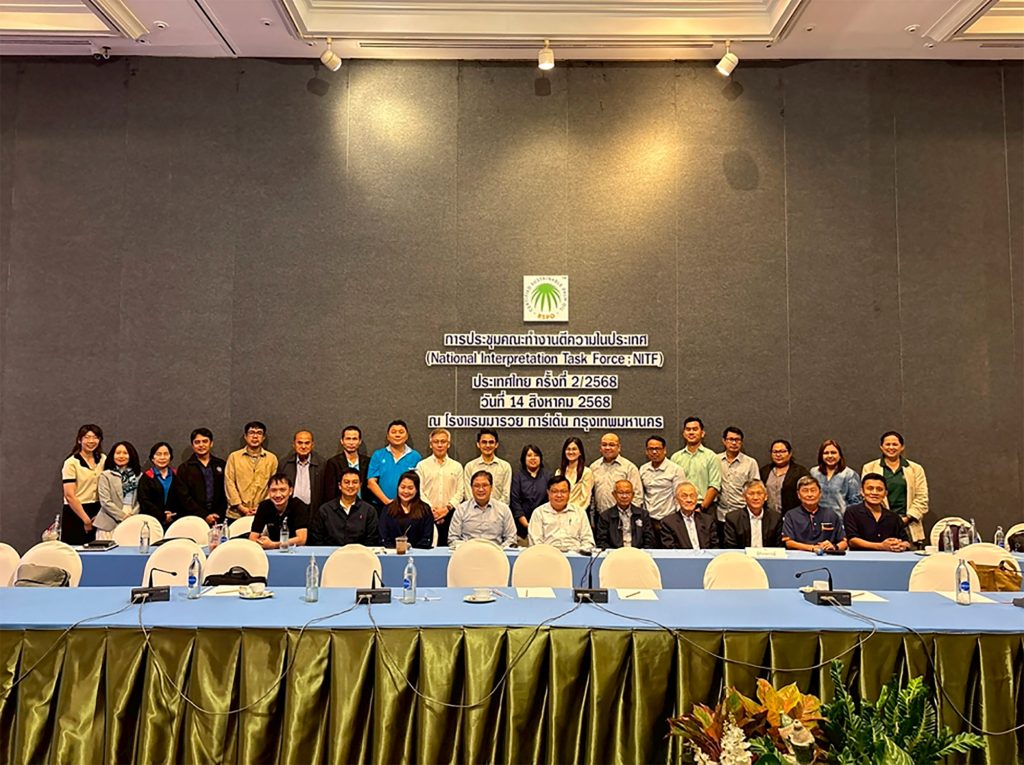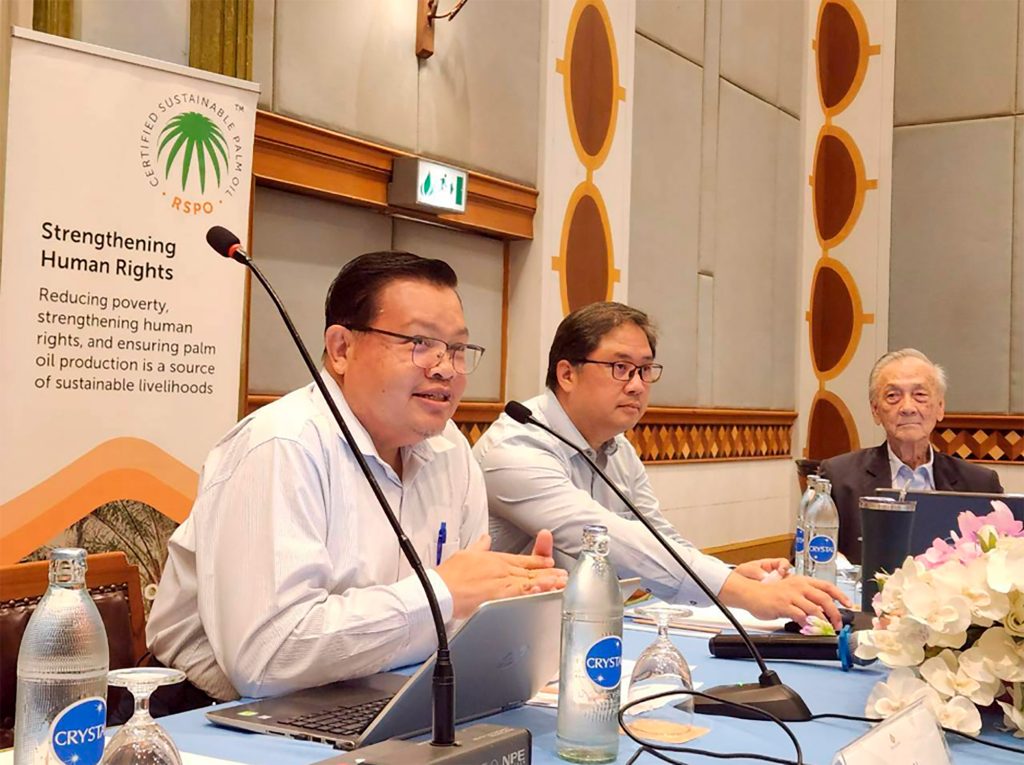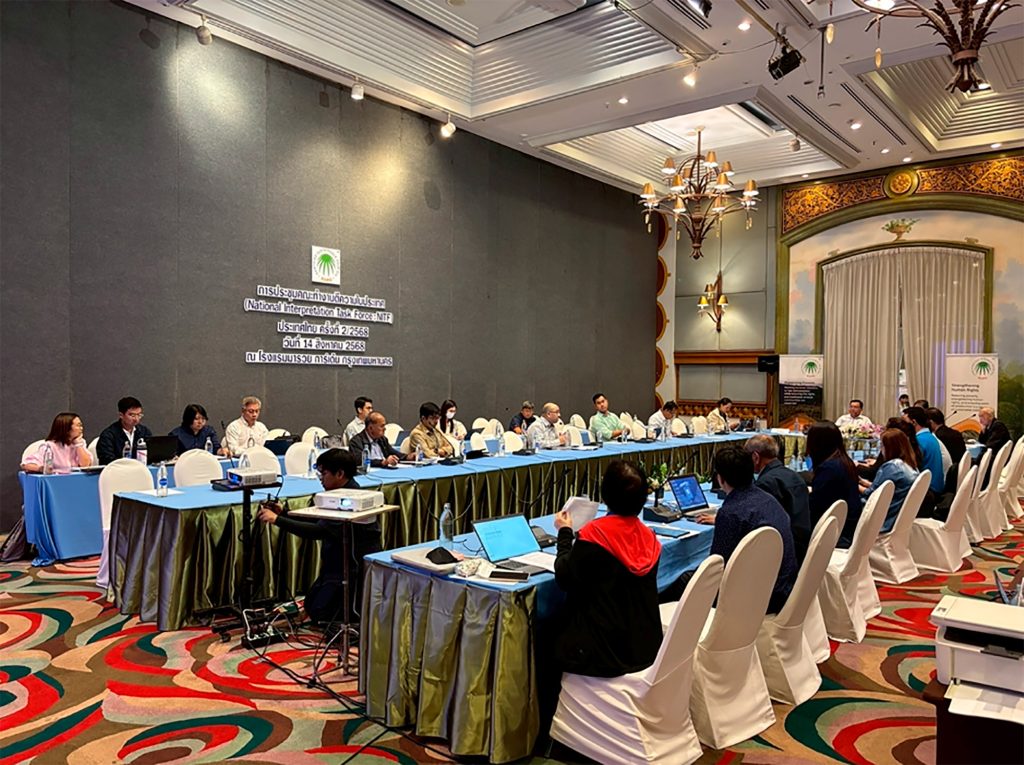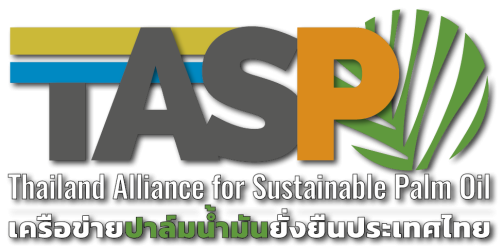English below

กรุงเทพฯ, 14 สิงหาคม 2568 – คณะทำงานตีความระดับประเทศ (National Interpretation Task Force: NITF) ได้จัดการประชุมเชิงคณะทำงานฯ เพื่อพิจารณาตีความมาตรฐานฉบับใหม่ขององค์กรเจรจาระหว่างประเทศว่าด้วยปาล์มน้ำมันยั่งยืน (Roundtable on Sustainable Palm Oil: RSPO) จำนวน 2 ฉบับ ซึ่งจะมีผลบังคับใช้อย่างเป็นทางการในวันที่ 13 พฤศจิกายน 2568 ได้แก่ (1) มาตรฐานหละกการเและเกณฑ์กำหนดของ RSPO สำหรับการปลูกปลา์มน้ำมันอย่างยั่งยืน และการผลิตปาล์มน้ำมันอย่างยั่งยืน (RSPO Principles & Criteria: P&C) ฉบับปี 2024 และ (2) มาตรฐานสำหรับเกษตรกรรายย่อยอิสระของ RSPO สำหรับการผลิตปาล์มน้ำมันอย่างยั่งยืน และผลิตภัณฑ์จากปาล์มน้ำมัน (RSPO Independent Smallholder: ISH) ฉบับปี 2024 วัตถุประสงค์หลักของการประชุมคือเพื่อสังเคราะห์แนวทางการปฏิบัติที่ชัดเจนและสามารถประยุกต์ใช้ได้จริงสำหรับผู้มีส่วนได้ส่วนเสียในประเทศไทย ตลอดจนสร้างความมั่นใจว่าการตีความและการบังคับใช้มาตรฐานดังกล่าวมีความถูกต้องและสอดคล้องกับบริบททางกฎหมายและสังคมของประเทศ
องค์ประกอบของคณะทำงานฯ ประกอบด้วยผู้มีส่วนได้ส่วนเสียจากภาคส่วนต่าง ๆ ในห่วงโซ่อุปทานปาล์มน้ำมันอย่างครอบคลุม อาทิ กลุ่มผู้ปลูกปาล์มน้ำมันขนาดกลางและขนาดใหญ่ เกษตรกรรายย่อยอิสระ โรงกลั่น ผู้ผลิตและแปรรูปผลิตภัณฑ์ และภาคส่วนที่เกี่ยวข้อง เช่น สถาบันการเงิน และองค์กรไม่แสวงหาผลกำไรทั้งในมิติสิ่งแวดล้อมและสังคม ที่ประชุมได้ร่วมกันพิจารณาตีความตัวชี้วัดในประเด็นสำคัญหลายประการให้สอดคล้องกับกฎหมายและข้อบังคับของไทย ประเด็นสำคัญที่ถูกหยิบยกขึ้นมาพิจารณาประกอบด้วย กฎหมายที่เกี่ยวข้องกับจรรยาบรรณในการดำเนินธุรกิจ กฎหมายว่าด้วยสิทธิการใช้ประโยชน์และการถือครองที่ดิน การตรวจสอบย้อนกลับแหล่งที่มาของทะลายปาล์มสด กระบวนการประเมินผลกระทบทางสังคมและสิ่งแวดล้อมสำหรับพื้นที่เพาะปลูกใหม่ การประยุกต์ใช้หลักปฏิบัติทางการเกษตรที่ดีเพื่อเพิ่มประสิทธิภาพการผลิต การประเมินและบริหารจัดการความเสี่ยงด้านสิทธิมนุษยชน ข้อบังคับเกี่ยวกับการใช้สารเคมีป้องกันและกำจัดศัตรูพืช แนวปฏิบัติสำหรับการปลูกทดแทนในพื้นที่ที่มีความลาดชันสูง การจัดการทรัพยากรน้ำและมลพิษ กระบวนการประชุมมีการนำเสนอบทบัญญัติทางกฎหมายของไทยที่สัมพันธ์กับแต่ละประเด็น ควบคู่ไปกับการอภิปรายและแลกเปลี่ยนทัศนะจากประสบการณ์การดำเนินงานจริง นอกจากนี้ ที่ประชุมยังได้รับฟังมุมมองจากผู้เชี่ยวชาญเฉพาะด้านและผู้ตรวจสอบ (Auditor) ซึ่งให้ข้อคิดเห็นที่เป็นประโยชน์ต่อการสร้างความสอดคล้องในการตีความมาตรฐานระหว่างหน่วยรับการตรวจและผู้ตรวจสอบ เพื่อให้เกิดความเข้าใจที่ตรงกันและสอดคล้องกับบริบทของกฎหมายที่เกี่ยวข้อง ภายหลังการประชุม คณะทำงานฯ จะดำเนินการสังเคราะห์และประมวลผลข้อคิดเห็นทั้งหมดเพื่อจัดทำ “ร่างการตีความระดับประเทศ” ของมาตรฐานทั้ง 2 ฉบับ จากนั้นจะเข้าสู่กระบวนการรับฟังความคิดเห็นสาธารณะ (Public Consultation) ก่อนจะสรุปและจัดทำการตีความระดับประเทศฉบับสมบูรณ์เพื่อเสนอต่อสำนักเลขาธิการ RSPO ตามขั้นตอนต่อไป

Thai National Interpretation Task Force Convenes to Contextualise 2024 RSPO Sustainable Palm Oil Standards

BANGKOK, 14 August 2025 – The National Interpretation Task Force (NITF) of Thailand convened a workshop to deliberate on the national interpretation of two new standards from the Roundtable on Sustainable Palm Oil (RSPO). The standards—the RSPO Principles & Criteria (P&C) 2024 and the RSPO Independent Smallholder (ISH) Standard 2024—are set to be formally implemented on 13 November 2025. The primary objective of the session was to synthesise clear and practical implementation guidelines for stakeholders in Thailand, ensuring that the interpretation and application of the standards are accurate and aligned with the nation’s legal and social frameworks.
The task force, comprising a comprehensive range of stakeholders from across the palm oil supply chain—including medium and large-scale growers, independent smallholders, refiners, and processors, as well as representatives from the financial sector and environmental and social non-governmental organisations—collaborated to interpret key indicators within the new standards. The deliberations focused on aligning these indicators with domestic laws and regulations. Key areas of discussion included: legal frameworks related to business ethics and conduct, laws governing land tenure and use rights, traceability requirements for Fresh Fruit Bunches (FFB), procedures for Social and Environmental Impact Assessments (SEIAs) for new plantings, application of Good Agricultural Practices (GAPs) to enhance productivity, human rights risk assessment and due diligence, regulations on the use of chemical pesticides, best practices for replanting on steep terrains, and management of water resources and effluents. The workshop’s methodology involved presentations on relevant Thai legal provisions for each topic, followed by robust discussions informed by the operational experiences of the participants. Critically, the session also incorporated perspectives from subject-matter experts and auditors to help establish a harmonised interpretation between auditing bodies and auditees, ensuring mutual understanding and legal compliance.
Following the workshop, the NITF will synthesise the collected feedback to formulate a ‘Draft National Interpretation’ for both standards. This draft will then be subject to a Public Consultation period before the final version is compiled and submitted to the RSPO Secretariat for formal endorsement.


